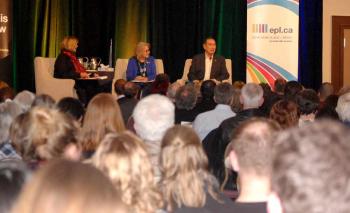Image Caption
By Shari Narine
Windspeaker Contributor
EDMONTON
In a crowd of more than 600 people—the majority made up of Edmonton Public Library patrons, non-Indigenous, and not having read the Truth and Reconciliation Commission’s 94 calls to action—a man with a doctorate in educational policy stood at the microphone and challenged the validity of the TRC and its findings.
Even after hearing from former Truth and Reconciliation Commission commissioners Dr. Marie Wilson and Treaty 6 Grand Chief Wilton Littlechild. They talked about the loss of culture, language and identity that resulted from generations of children that went through the Indian residential school system.
Wilson told the man that the commission heard from 7,000 of 80,000 residential school survivors (a figure that beat any population sampling demanded for a representative finding) and that testimony outweighed anything historians could say.
“We heard from the experts we needed to because they lived that part of the story,” she said. “We heard such a consistency of poor story lines (that) it became pretty uncontestable.”
Wilson and Littlechild kicked off Edmonton Public Library’s Forward Thinking Speaker Series for 2017 in a packed room on Feb. 28. The event in Edmonton also celebrated Freedom to Read Week.
The pair was guided through discussion by CBC Radio host Shelagh Rogers, an honorary witness for the TRC.
Wilson’s was a poignant response to a disturbing question that followed a heartfelt presentation by Wilson and Littlechild in which they spoke about the difficulties they faced in listening to the painful stories of survivors.
Earlier in the evening, Littlechild had said he was encouraged with what has followed since the commission wrapped up its work in 2015.
“In the schools, in the communities, in the boardrooms, in government chambers, council chambers, legislatures, I see and I feel this commitment and it’s so encouraging for me. Because the biggest fear I had as a commissioner, knowing the history of some of the previous commissions, is that our report would just sit on a shelf and gather dust,” he said.
Wilson also expressed hope about how the commission’s work was continuing.
“We are still incredibly busy even though the commission’s been officially finished since December of 2015 and that’s because the interest is sustained and sustaining,” she said.
But, she added, the work is far from done and it doesn’t rest on the shoulder of the government—federal or provincial—alone.
“We have a shared responsibility and accountably as citizens to play our role as government. We need to act as if we are the government and make sure that we’re giving the direction to a leadership we elect and that we hold them to deliver on it because, in the end, down the road, if nothing changes then it doesn’t matter what we said we promised to do,” said Wilson.
The TRC delivered its final report in 2015, outlining 94 calls to action. Littlechild and Wilson were joined by Justice Murray Sinclair spending seven years crossing the country, hosting national events and attending community events to hear from survivors of residential schools.
Edmonton Mayor Don Iveson said becoming an honourary witness for the TRC “changed my life.”
He also noted that the city has “taken those calls to action seriously,” implementing training and education for its employees.
“By talking about it and learning about it and by sharing with one another that’s how we actually find the truth,” said Iveson.
Rogers pointed out that one of the pillars in Canada’s celebration of 150 years is reconciliation.
“But we know that it can’t just be a slogan, it can’t be a buzz word, it can’t be the flavour of the year. When the candles, all 150 of them, are blown out, at the end of that year we really want to have a commitment to reconciliation,” she said.

